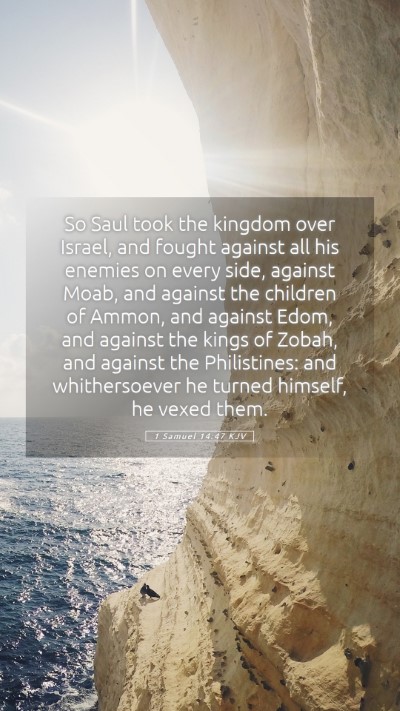Bible Verse Commentary: 1 Samuel 14:47
Bible Verse: 1 Samuel 14:47 - "So Saul took the kingdom over Israel and fought against all his enemies on every side, against Moab, and against the children of Ammon, and against Edom, and against the kings of Zobah, and against the Philistines: and whithersoever he turned himself, he vexed them."
Understanding the Context
This verse provides a summary of King Saul’s tenure as the first king of Israel, highlighting his military efforts against various neighboring nations. The overall sentiment behind this verse reflects Saul's zealous commitment to defend and expand Israel’s borders, yet it also foreshadows the challenges he would face as a leader.
Commentary Insights
- Matthew Henry: In his analysis, Henry emphasizes Saul's lengthy struggles against the enemies of Israel, noting that his reign was marked by continuous warfare. Henry points out the importance of Saul's victories but also hints at the tumultuous nature of his leadership, suggesting that such constant conflict was indicative of deeper issues within Saul's character and relationship with God.
- Albert Barnes: Barnes expands on the enemies mentioned in this verse, elaborating on the historical context of conflicts with Moab, Ammon, Edom, and the Philistines. He suggests that this portrayal serves to illustrate Saul’s role as a military leader and to set the stage for future narratives in scripture where Israel faces internal strife and external battles. This commentary underscores the notion of Saul as a protector, yet foreshadows his isolation from divine favor.
- Adam Clarke: Clarke provides a detailed explanation of the various adversaries Saul faced. He highlights the significance of Saul having to constantly battle—indicating that his reign was marked by contentious relations with surrounding nations. Clarke also points out the phrase "and whithersoever he turned himself," suggesting that Saul was continually engaged in warfare, hence the reference implicates his role was not only defensive but also assertive against perceived threats.
Key Themes and Applications
The themes that surface within 1 Samuel 14:47 include the burdens of leadership, the significance of divine guidance, and the consequences of straying from God’s commands. Saul's military endeavors depict the sacrifices leaders must make, and they reflect the often tumultuous nature of wielding power responsibly.
Leadership and Responsibility
Saul's battles highlight the heavy weight of leadership. The modern reader can draw parallels to the necessity for wise and discerning leadership in their own contexts, whether in spiritual, familial, or societal roles. Leadership often demands sacrifice and determination, qualities that are illustrated through Saul's continuous fighting.
Spiritual Warfare
This verse can also be seen as a metaphor for spiritual battles that believers face today. Just as Saul contended with various foes, Christians are called to stand firm against spiritual adversities with the armor of God (Ephesians 6:10-18). The involvement of multiple nations can symbolize the diverse challenges believers encounter in their spiritual journeys.
Cross References
- 1 Samuel 15:24 - Saul's disobedience and the consequence of God’s judgment.
- 1 Samuel 28:6 - Saul’s troubling state leading to seeking the counsel of a medium.
- 2 Samuel 1:10 - The aftermath of Saul’s death and the transition of power.
- 1 Chronicles 10:13-14 - A reflection on Saul’s failures and his unfaithfulness to God.
- 1 Samuel 13:14 - God's choice of David as a man after His own heart.
Conclusion
1 Samuel 14:47 serves as a crucial passage in understanding the character and reign of Saul. This commentary integrates key insights from public domain theologians, outlining the themes of leadership, the spiritual significance of battles, and the lessons that can be drawn from Saul’s experiences. Individuals engaging with this text through Bible study groups or personal study will uncover vital principles on leadership, warfare, and reliance on God that are applicable to contemporary life.
For deeper biblical study, consider utilizing various Bible study tools and resources that help unravel scripture meanings, interpretations, and broader theological insights on passages such as this one.


